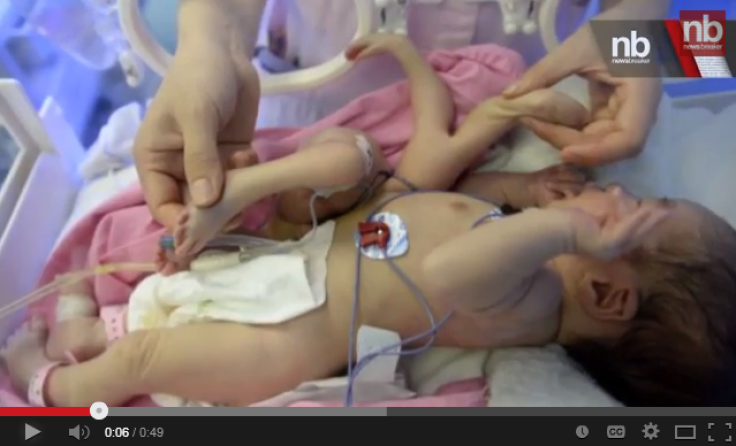Baby Born With 4 Feet And 4 Arms In China Undergoes Surgery To Remove Extra Limbs

A baby born on April 2 in China’s Guangdong Province with four arms and four feet has undergone successful surgery this week to remove the extra limbs. The baby was reportedly joined at the torso to a headless parasitic twin.
Doctors had reportedly missed the extra limbs when doing medical examinations on the pregnant woman. However, the child’s father, identified as “Mr. Chen,” felt responsible for his son’s defects because he did not take proper care of his wife, or send her to the doctors for regular check-ins. “I only cared about my work,” he told ImagineChina. “I just thought of making money instead of taking [my wife] to hospital for a medical checkup.”
Though the cause of the child's extra limbs is not certain, it could be a case of polymelia (Greek for “many limbs”) — a birth defect in which the person has five or more limbs. The extra limbs are often deformed or shrunken, and likely the result of an embryo that started as conjoined twins but left one twin degenerated except for its limbs.
In 2007, a baby girl born with eight limbs in India — considered a reincarnated “goddess” in her village — underwent an extensive several-day operation to remove the torso and legs of a conjoined twin that had not formed properly. Lakshmi Tatma had been born in one of the most remote regions of India known as Bihar, filled mostly with Hindu farmers. Word of this “goddess girl” reached Sparsh hospital in Bangalore and the ears of Dr. Sharan Patil, an orthopedic surgeon. “In spite of whatever the beliefs were, as a medical man, I thought she needed help,” Patil told CNN. Though doctors believed she wouldn’t survive into adulthood or even survive the surgery, they managed to cut off her parasitic twin by the spine without paralyzing her, removing the extra limbs and readjusting organs properly. Now, Lakshmi is able to run, walk, and attend school, whereas before she could not walk or even sit up.
However, Lakshmi also faces future operations and obstacles. Firstly, she may experience severe back deformities due to the nature of her spine that could worsen as she gets older. Her hips remain too far apart, which would require another surgery; likewise, she is lacking buttocks due to the specific way she was connected to the headless twin. She also has issues with several internal organs, including her intestines and bladder. “All we want is for her to be a normal child,” Lakshmi’s mother told the Daily Mail. “She has had her operation but even now she can’t walk or move normally.”
Parasitic twins occur when a twin embryo develops in the womb but does not fully separate from the other twin. One embryo ends up becoming the dominant one, often at the expense of the other, whereas conjoined twins typically both grow equally. The undeveloped twin ends up becoming parasitic, not conjoined, meaning it depends entirely on the function of the more developed — and dominant — twin.



























